If you are on a budget or just plain refuse to pay the extra for organic fruits and vegetables, there really are some good reasons to buy at least a few of those items in the organic version if you can.
We buy as much organic produce as we can, and of course, sometimes you have to buy the non-organic version. But I like knowing that most of my fruits and vegetables were not sprayed with toxic chemicals. It only makes sense to avoid them – after all, you don’t go around pouring pesticides in your mouth or on your clothes, so why would you want to eat food that is either A. coated with it or B. full of it? Pesticides are toxic, and they are designed to kill bugs, weeds, rodents, fungi, rot, and other pests – do you really want to eat that stuff?
These chemicals have been shown to suppress the immune system, increase the risk of breast and other cancers, disrupt the pheromone and hormonal system, and do reproductive harm.
And while you might initially say that you ate regular versions of these fruits and vegetables while you were growing up and you are fine now, the amount and incidences of pesticide use have skyrocketed in recent years – times have changed.
Convinced yet? Great! So now I have convinced you that you don’t want to buy the toxic pesticide versions, but you want to know which fruits and vegetables should be bought only organic and which ones it is safer to skimp on, right? Well, if you can pick and choose your organics, there are definitely fruits and veggies that either requires less pesticide or absorb less of it, so let’s take a look.
The following fruits and vegetables tend to be higher in either pesticide use and/or absorption:
- Peaches
- Pears
- Green Beans
- Apples
- Squash
- Strawberries
- Raspberries
- Spinach
- Potatoes
- Tomatoes
The following fruits and vegetables tend to have less pesticides in them:
- Pineapples
- Mangoes
- Avocado
- Bananas
- Cauliflower
- Watermelon
- Kiwi Fruit
- Brussels Sprouts
- Eggplant
- Blueberries
- Radishes
- Onions
- Grapefruit
Even with washing and peeling, you cannot get rid of pesticides in your fruits and vegetables. And besides, with peeling you might be losing a lot of the good nutrients. So when you can, choose the organic version of your product just to be on the safe side. But when you cannot, at least keep in mind which products contain fewer pesticides and might be safer for you to eat!
I was going to start research on this, but GOOD Magazine beat me to it. By the way, if you are not reading GOOD, you should check it out. Here’s a chart of what major gigantic companies own your little tiny favorite organic food companies, and you can click it for a bigger version:
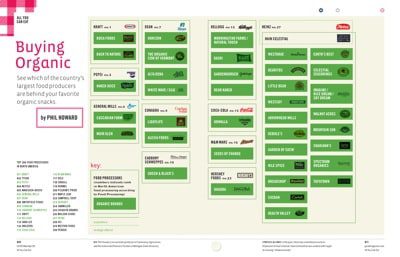



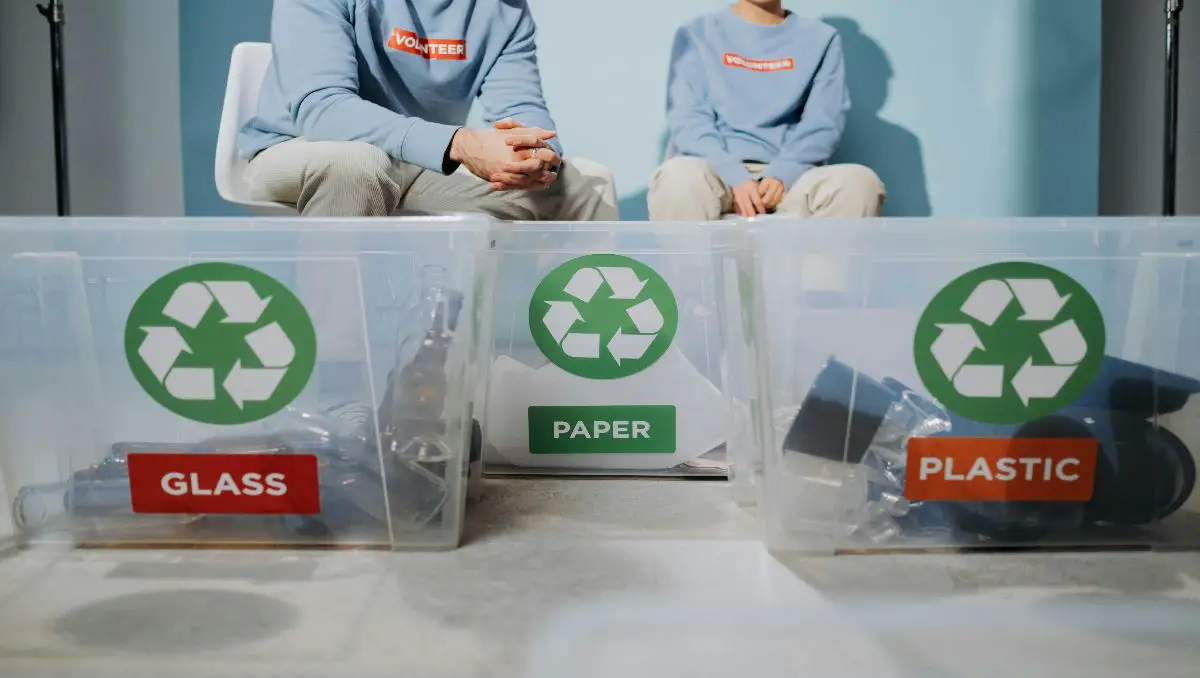
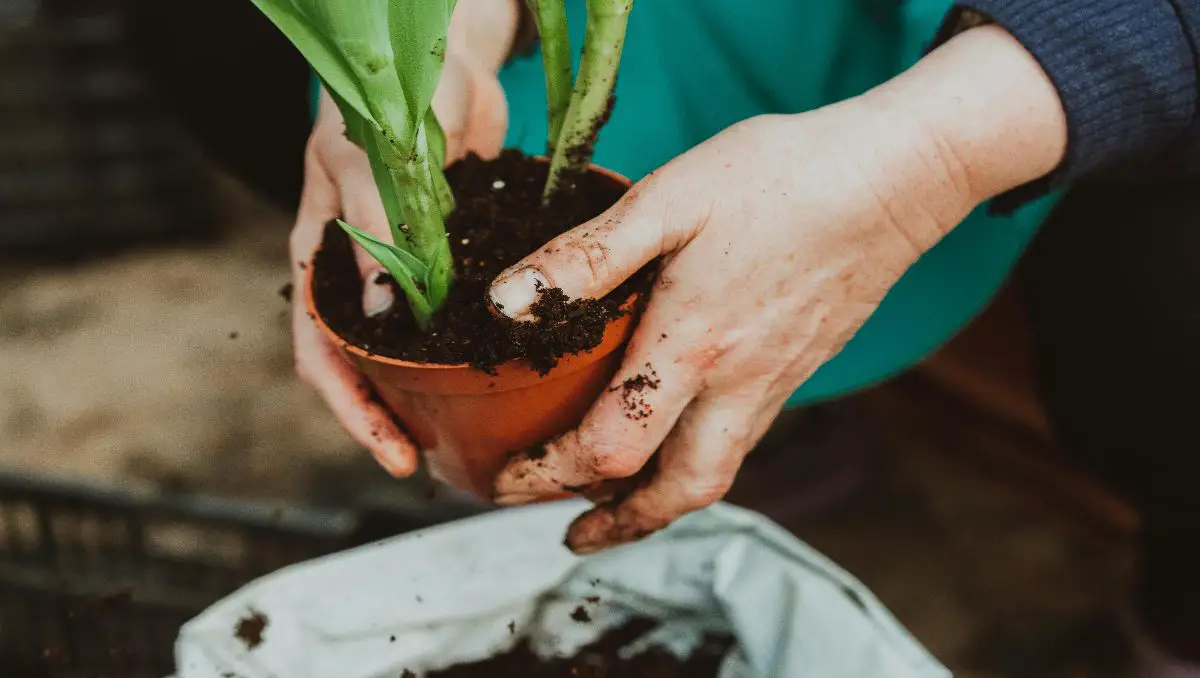
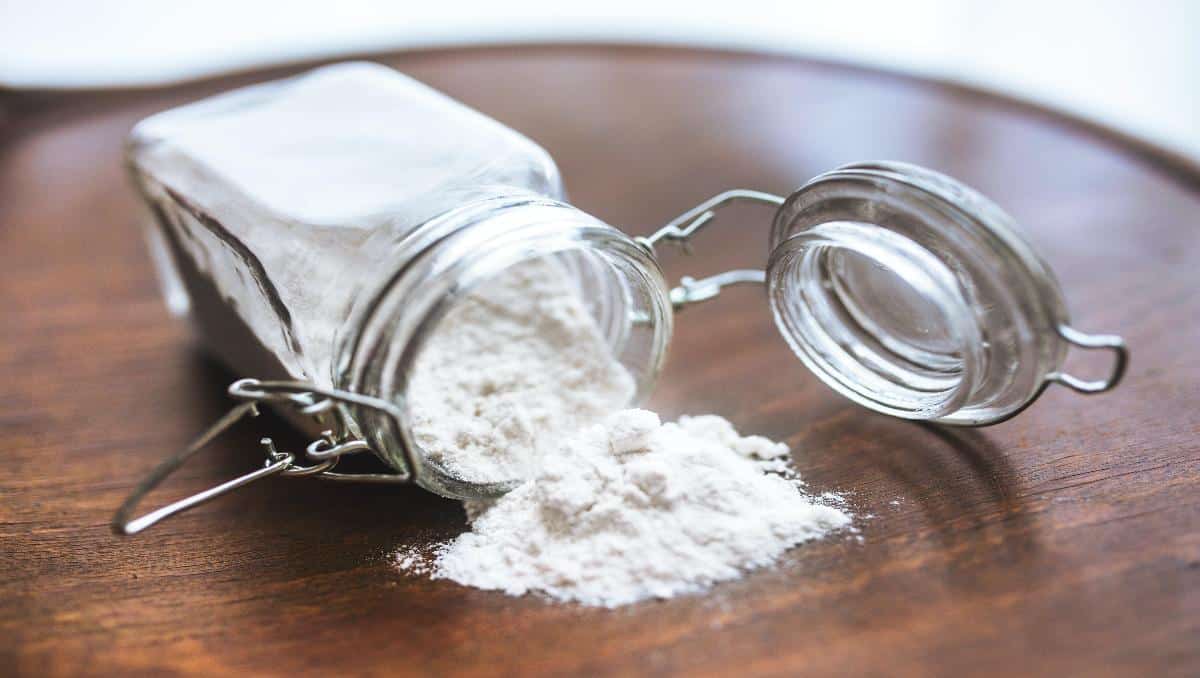
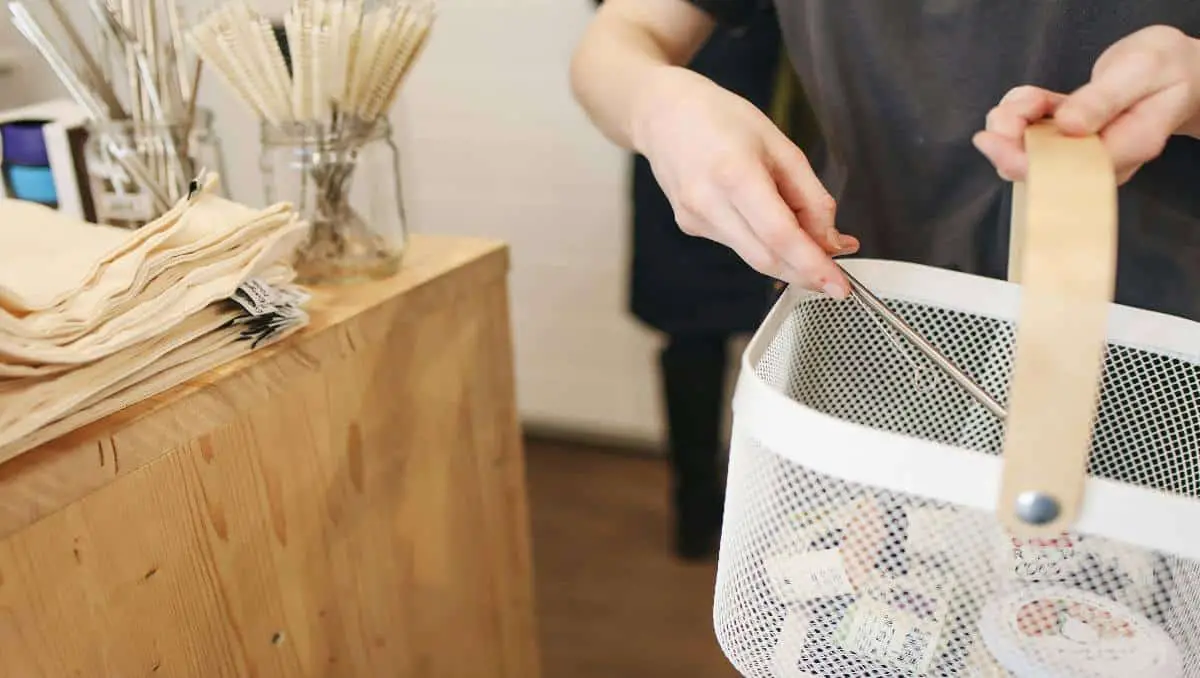
Thanks Tracey, appreciate your insight!
I work in the pesticide labeling industry (sleeping with the devil, I know!). Asparagus is also very safe as nothing can be sprayed on it once it comes out of the ground. Chickpeas and lentils likewise have virtually nothing labeled for them once they start to produce.
Its also worth noting that pesticides and other chemicals concentrate when things are dried or distilled. So there may be high residues in your herbs and spices or things flavored with essential oils than in the fruit.
I always wonder which ones are best to buy. Thanks for doing the homework on the fruits and veggies so that I don’t have to. Very valuable for my shopping days to come.
Hi, I don’t see carrots on your list. I have heard that they are one of the worst veg for residues. It’s partly down to what growers have to do to keep the crop ‘clear’ from pests and diseases, and carrots have the dreaded carrot fly to overcome.
Tom, I could not identify carrots as being on either list, so I left them off. But I would imagine, since we eat them whole and they grow in the ground, that I would buy those in organic too. I just could not find a definitive answer on them.
May I ask if any information on oranges and mandarins is available? They are a popular fruit but I am not sure of the quanitty of pesticide residue on them.
Nectarines are the 5th worst and oranges 16th, with peaches being the #1 worst in terms of pesticide absorption. Hope that helps!
Yep, everything was organic before, so it can be hard to convince people that nowadays everything is coated with pesticides and other toxic stuff. Thanks for the story Lorraine, glad your mom learned a little!
It’s sad, I know, but also getting the older generation to buy organic can also be a bit of a struggle. My Mother is in her 80’s. She stayed with me recently (for a month :)) and was alarmed when I chose organic at the store. She really didn’t know what the fuss was about (because, in her day, most things were organic but not labeled as such), that the regular stuff is full of nasties and she just thought it a complete waste of money.
Needless to say, after 4 weeks at my house, she’s now gone home with a new outlook on grocery shopping, so maybe all is not lost!
what is a good organic spray fro sweet corn,green beans,potato,eggplant?
Vinegar is the best thing to use if possible.
Thanks David!
I found this a lot more helpful than just a blanket ban on nonorganics because cost is one of the biggest obstacles for grocery shoppers (and college students coughcough). I will definitely pass this on to my friends. Do you have a link to that list btw?
No, I don’t have a link because I researched it from a bunch of different sources. Just shoot them the URL for this post
You can also use castile soap to wash vegetables. I would even wash organic varieties, because you do not know what has happened to it, or who has touched it, prior to making its way to your plate.
If you did not grow it yourself, wash it.
Last year pineapples from Costa Rica got on a list here in Norway as having tested really high for pesticide residues…
These were controls done by the Norwegian dept. of agriculture.
You raise some interesting points about when to buy organic. However, the Organic Trade Association would caution people against the idea of limiting their organic purchases to the list of items you outline in this blog. While establishing such limits may help to reduce the size of your personal food budget, it misses an important point: buying organic is about more than keeping pesticides out of our bodies. It is about supporting a system of sustainable agricultural management that promotes soil health and fertility through the use of such methods as crop rotation and cover cropping, which nourish plants, foster species diversity, help combat climate change, prevent damage to valuable water resources, and protect farmers and farmers”™ families from exposure to harmful chemicals. In this sense, buying organic is a commitment to the bigger, more complex picture of which our personal health is a part.
http://www.organicitsworthit.com
Hi Robb
Here in the Uk we recently had a study publicised to say that there is no scientific evidence to prove organic is any more healthy than inorganic. My guess is that the results of these surveys depend to a large degree on who funds them.
I’m not actually sure we need scientific surveys to work this one out. It’s pretty obvious that pesticides and fertilisers kill forms of life – in the case of pesticides that is what they are designed to do, and fertilisers obviously do – check worm counts and insect and plant divesity etc. – so if they do that when applied to the crops how can that be good for you when you eat the residues. I know the chemical companies will say that the poisons disintegrate into harmless residues over time, but I prefer to err on the side of caution, and into the bargain help preserve the biodiversity of the planet.
Not trying to be a skeptic here, but does anyone know of any studies that find organic foods being any more healthy than non-organic? Or, for that matter, is there any way to verify that they’re more eco-friendly? Based on some work I used to do regarding the evolution of the USDA organic seal, it seemed pretty apparent that the legislation had a ton of loopholes. Does anyone have any references for me? I’m just trying to educate myself to be a better eco-citizen.
http://thegoodhuman.com/2009/08/11/to-organic-or-not-to-organic-its-an-obvious-choice/
Even if a fruit of vegetable was not labeled USDA organic.. because you bring about the evolution of the particular “organic stamp” on products. There are local farmer’s markets in which you can directly speak to farmers about their farming practices (if pesticides, fungicides, herbicides) are being used and the quality of their soil (how many minerals and what kinds of minerals are in them). As a consumer, that’s what we hope for when we buy anything organic when local farmer’s markets aren’t around as much (say around the winter time in NY for me).. but organic, in general, is without a doubt healthier because of the lack of chemicals and the soil quality being used on the fruits and veggies. I’d suggest you watch Hunger for Change and Food Matters and take up some reading. We are all learning along the way. Good luck :).
more insight regarding how to differentiate the benefits of organic intake
Hi David, This post is extremely helpful. Thank you so much. I will be able to better calculate my organic/non-organic purchases now. Would you mind very much if I quoted your lists in my blog (http://mommy-nature.blogspot.com) with a reference and prominent link back to you? I think that my readers would find this equally helpful. Thanks so much for considering my request. Peace always, Deb
I’d add that celery is important to buy organic, since the chems travel up inside the stalk. Soaking the regular kind for a few days can “rinse” the celery out for a less bitter taste, but it’s never as good as the organic stuff!
My partner and I are on a tight budget. I buy all of my meat, eggs, and produce from the Farmers’ Market from June through November, when the produce truly is fresh and local. I am also confident that it really is organic. From December to June again, unfortunately I eat conventional meat and produce. I am making a new pact to stay away from the Dirty Dozen during my conventional period.
Lorraine- I understand about the older generation. My grandparents literally believe that “organic” means that the produce was grown in human waste!
Wouldn’t it be great if everyone could afford to eat organic. But the truth is the price is so much higher that most people just cannot justify the cost when trying to feed their families. So why isn’t everything organic? That’s an easy one. Organic is more expensive and they want to keep it that way. Even the organic community is against the mass production of organic foods because to do so (even when it is done right) would bring the cost of organic foods down.
Robert – In the last 3 states I have lived in, CA, NM, and CO, organic is pennies more than regular. Literally, pennies. It’s not that much more expensive. That being said, I would love to see some info on “organic community is against the mass production of organic foods because to do so (even when it is done right) would bring the cost of organic foods down.” – Do you have info on that I can read?
It is amazing how many people still are ignorant about eating organic. As the months go by, more and more pesticides threaten our bodies. Just discovered your blog. I write about green living on Cape Cod in mine.
Another reason to avoid conventionally grown fruits and veggie whenever possible (especially if you live in CA) – an extremely toxic & carcinogenic gas, Methyl Iodide, is on its way to being approved for use in California – probably the largest agricultural producer in the US.
This is very scary – because the toxicity of this chemical is so strong that it won’t only affect us by consuming fruit and veggies grown with it – but by living in the surrounding areas where it’s being sprayed.
So in other words, even if we refrain from buying non-organic, there’s a good chance we will still be exposed to the Methyl Iodide(classified as a human carcinogen) because of the massive amounts used during fumigation. And who’s to say this won’t contaminate neighboring organic crops?
I have to be practical – I can’t always afford to buy organic – but make a conscious effort to as much as possible, and I feel so much better when I do.
These tips are great and pretty realistic for the average person to follow – I’ll for sure pass it along. Thanks!
Thanks for the info David. I have a baby who will be having solids very soon and your article has been very helpful. Do you have any info on sweet potatoes, pumpkin, butternut squash, parsnip, swede, plums, nectarines, leek and zucchini?
I don’t, Viv, but will see if I can find anything about them. Thick skins are safer, in terms of what gets in them, than thin ones. So in theory, not much would get in to a butternut squash, but a lot would get into a plum.
Guys, here is a link to a report done on nutrient density in conventional versus organic. It clearly states that there are more nutrients in organic produce. And of course, no toxic chemicals with their concomitant health problems.
You be the judge, on both sides there are people who stand to benefit and studies can be easily rigged by justifying throwing out data. But still, I know where I stand.
http://www.organic-center.org/reportfiles/YieldsReport.pdf
Just a thought-if you are fortunate to have even a little space strawberries are quite easy to grow, can be used as a ground cover.
Just be sure and get an ever bearing variety so you can be in fruit all summer long.
That’s so funny. I literally just wrote a post about the “Clean Fifteen” & the “Dirty Dozen”. We should compare notes. I love your blog and am a regular reader and just wanted to say thanks for all the good information.
What about prunes. That should be organic?
Everything should be if you can afford it.
Grapes are very bad too. My parents grew them, 15 times a year you have to apply chemicals.
Also, I thought that bluberries were bad too.
What about Zucchini? I’m guessing the thin skin means it should be organic but mushrooms interestingly are not on that list.
Should we buy dried prunes, dried cranberries, dried apricots and raisins organic?